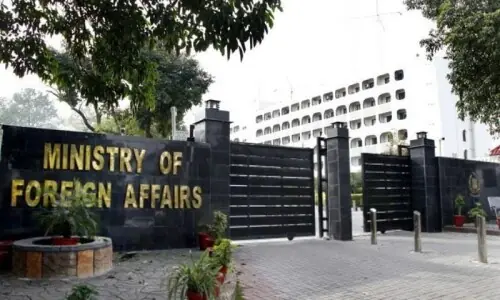ISLAMABAD: Pakistan and Russia have finalised a memorandum of understanding (MoU) for conducting a ‘feasibility study’ of the planned undersea gas pipeline.
While speaking at the weekly media briefing, Foreign Office (FO) spokesman Dr Muhammad Faisal said: “The ministries of energy of Pakistan and the Russian Federation have finalised a MoU for conducting feasibility study for implementation of undersea gas pipeline project.”
The undersea gas pipeline project would eventually involve four countries — Pakistan, Iran, Russia and India. The project has been under discussion since last year.
Read: Groundbreaking for Tapi pipeline delayed till interim govt
“The purpose of the MoU is to assist in providing support for the realisation of the project. Based on the results of the feasibility study, the two sides will take a decision for its future,” the spokesman said.
FO warns India that aggression would be duly responded to
Russia, he added, had been keen on promoting energy cooperation with Pakistan as the two countries strengthened their ties. “The two countries have concluded various proposals in the energy sector, including construction of North-South Gas Pipeline, import of LNG from Russia, installation of air mix plant and establishing a 600MW combined cycle power plant,” Dr Faisal said, recalling energy projects undertaken jointly.
Responding to a question, he denied that the new project would replace the stalled Iran-Pakistan gas pipeline project. “The IP gas pipeline is a separate project,” he clarified.
The spokesman reiterated that Pakistan remained committed to peaceful resolution of disputes with India, but any misadventure would not go unpunished.
“Pakistan wants to live in peace. However, if aggression is thrust upon us, it would be duly punished. Let there be no mistake. We expect maturity from India in this regard,” he said when asked to comment on a recent statement by a BJP leader.
Ravinder Raina, a BJP leader, had in an interview said: “India will lose patience and give it a more befitting reply, much harder than the last surgical strikes.”
Dr Faisal, while reacting to the statement, said Pakistan was ready to defend its borders and any Indian misadventure shall be given a befitting response.
Last week, armies of Pakistan and India restored their 2003 ceasefire agreement.
The spokesman recalled that Pakistan had consistently held to the position that “a meaningful and result-oriented dialogue” was the only way forward.
Expressing concern over the testing of Agni V. — an advanced nuclear-capable intercontinental ballistic missile — by India, the spokesman said Indian arms build-up had pushed the region into a vicious arms race.
“Its hegemonic designs are a cause of serious concern not only to Pakistan but also to the entire region. Indian thirst for becoming a regional hegemony is casting a dark shadow on South Asia,” he added.
Published in Dawn, June 8th, 2018
































